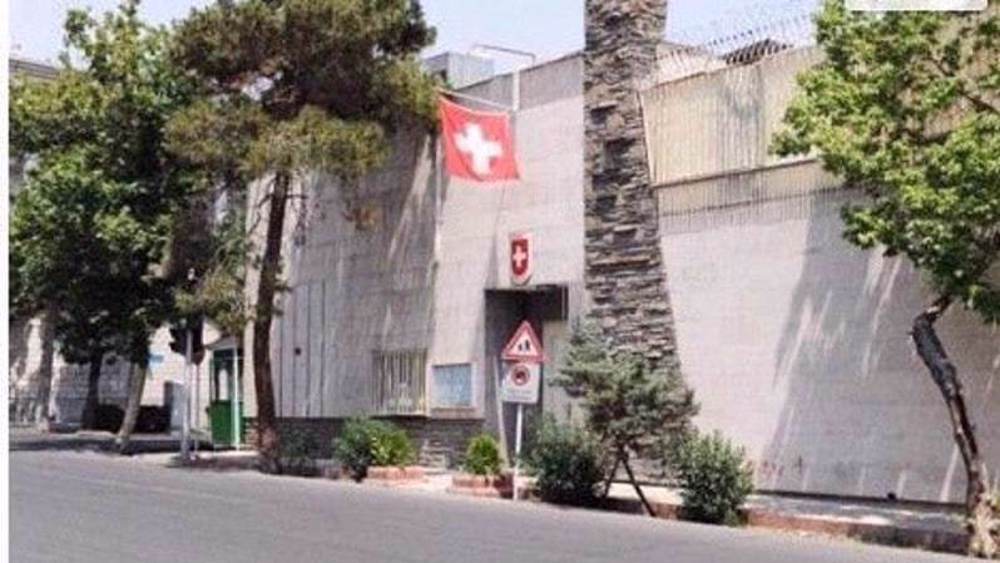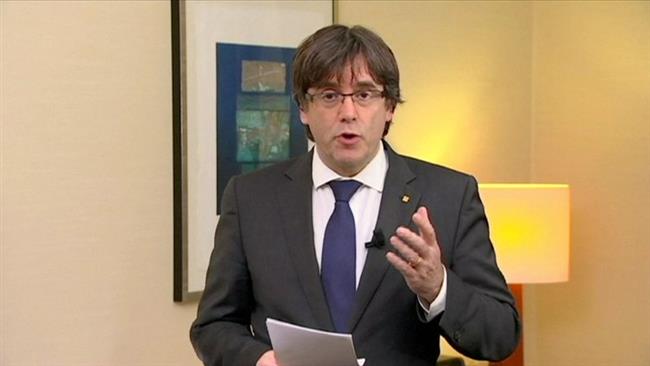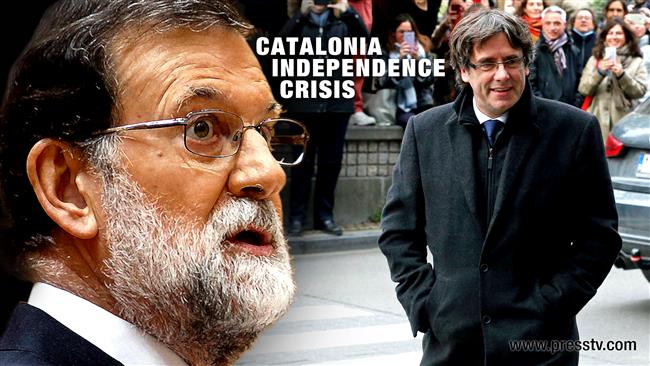Belgian judge grants ex-Catalan leader Puigdemont provisional release
A Belgian judge has conditionally released Catalonia’s sacked president, Carles Puigdemont, and four ex-ministers, after they turned themselves to police in Brussels to face possible extradition to Spain over “rebellion” plots.
The five Catalan politicians fled to Belgium after Spanish authorities removed them from office in late October. They were taken into custody on Sunday on European arrest warrants issued after they failed to show up in Madrid last week for questioning.
A statement by the Belgian prosecutor’s office said that “the provisional release of all persons sought has been granted by the investigative judge.”
The investigative judge determined that, at this stage, there was no reason to put the five behind bars, according to the statement.
The defendants will appear before a Belgian court within the next 15 days, the statement added, further adding that the judge’s decision could not be appealed.
The statement by the prosecutor’s office noted that the five defendants, Puigdemont included, were all forbidden to leave the country without the judge’s permission, must inform authorities of their whereabouts, and obey all court and police summons.
The five Catalans face possible extradition to Spain for allegedly plotting a rebellion and sedition after the region held a secession referendum under Puigdemont’s rule in October and declared independence from the mainland based on the results of the vote.
Puigdemont and some of his ministers fled to Belgium last week after the Spanish government responded to the Catalan declaration by dismissing its regional administration and imposing direct rule there.
Nine other deposed Catalan Cabinet members heeded a Spanish judge’s summons for questioning in Madrid on Thursday.
‘We want our voices heard’
Spain issued arrest warrants for Puigdemont and the four ministers on Friday after they failed to appear in court to face charges.
The Catalan refused to return to Spain, maintaining they could not get fair trials there.
The sacked regional officials said they wanted to make their voices heard in the heart of the European Union.
Puigdemont and his fellow separatists claimed that the referendum on independence held on October 1 gave them a mandate for separation from the Madrid government, even though it had been prohibited by the nation’s highest court and only 43 percent of the electorate took part in the vote.
Puigdemont’s party has now put him forward as its leader for an upcoming regional election called by the Spanish government — meaning he could end up vocally heading a campaign from Brussels while he fights a forced return to Spain.
The Belgian prosecutor’s office said the whole extradition process could take more than 60 days, well past the December 21 date set for the regional election in Catalonia.
Tensions high in Catalonia
Meanwhile, pro-secession Catalans gathered in towns across the region to voice support for their sacked officials.
“We want to send a message to Europe that even if our president is still in Brussels and all our government now is in Madrid jailed, that the independence movement still isn’t finished,” 24-year-old protester Adria Ballester said in Barcelona.
Meanwhile, parties opposed to breaking away from Spain try to rally support to win back control of Catalonia’s regional parliament, pro-secession parties are debating whether or not to form one grand coalition for the upcoming ballot.

Another former president of the region, Artur Mas, told Catalan public television on Sunday that he backed a fusion of parties for the December vote. But Mas said the main goals of secession supporters must be recovering self-rule and the release of the jailed separatists.
An opinion poll published by Barcelona’s La Vanguardia newspaper on Sunday forecast a tight election between parties for and against Catalonia ending the region’s century-old ties to the rest of Spain.
The poll predicts that pro-secession parties would win between 66-69 seats, less than the 72 seats they won two years ago. Sixty-eight seats are needed for a majority.
California's fires reminiscent of Israeli savagery in Gaza: Zarif
VIDEO | Press TV's news headlines
Israeli ministers discuss plot to divide Syria: Report
Pezeshkian felicitates Aoun on election as Lebanon’s president
VIDEO | Brutal murder of journalist in India prompts calls for justice
VIDEO | Iran unveils new AI drone in Great Prophet 19 military drills
110,000 Basij forces display defense capabilities in Tehran parade
VIDEO | Joseph Aoun elected as president of Lebanon















 This makes it easy to access the Press TV website
This makes it easy to access the Press TV website